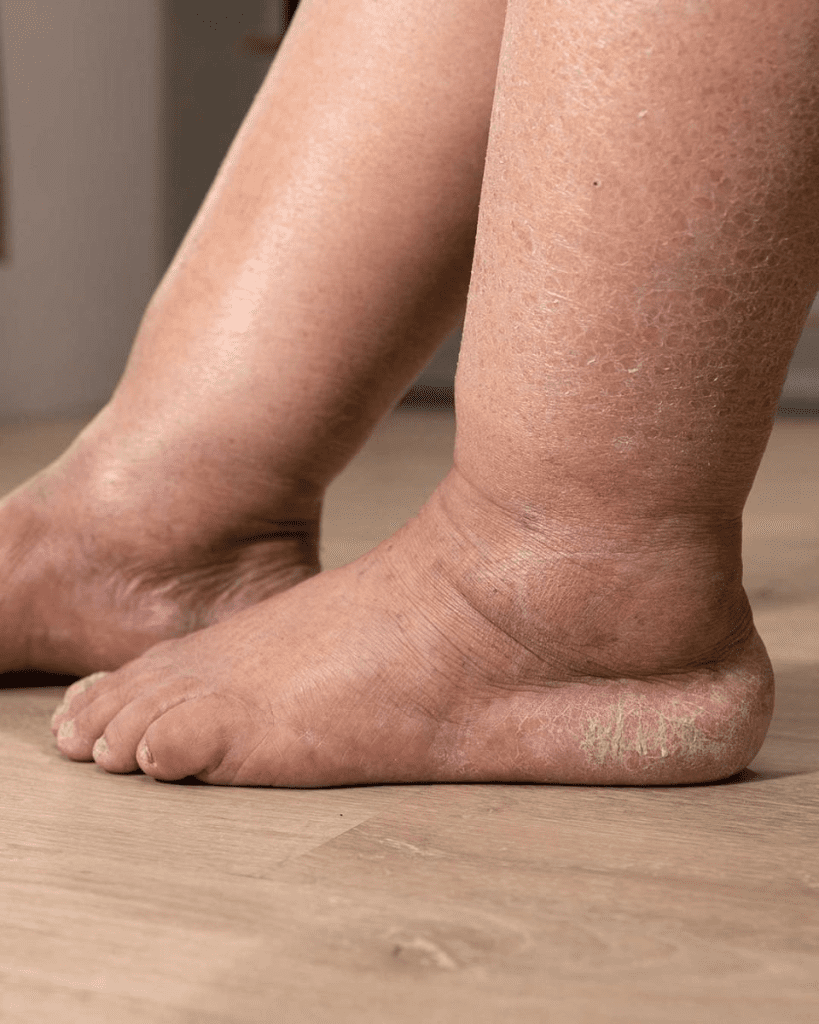The lymphatic system might not get as much attention as the heart or lungs, but it plays a critical role in keeping our bodies healthy. As part of the immune system, the lymphatic system transports lymph fluid, which contains white blood cells and waste products, throughout the body. It helps flush out toxins, absorb fats and fat-soluble vitamins, and defend against infections. But what happens when this vital system becomes overloaded and stops functioning properly? A toxic lymphatic system can lead to a variety of health issues, making it essential to recognize the warning signs before they become more serious.

1. Swelling and Inflammation
Swelling is one of the most noticeable symptoms of a toxic lymphatic system. This condition, known as lymphedema, occurs when the lymph fluid builds up in the tissues, often leading to swelling in the hands, feet, and ankles. The swelling is usually more pronounced in the lower extremities, but it can affect any part of the body.
When lymphatic drainage slows or stops, it can lead to significant discomfort, restricted movement, and even pain. Ignoring this symptom could allow the issue to worsen, eventually impacting your mobility and quality of life.
2. Persistent Fatigue
Feeling tired all the time? Chronic fatigue is another common sign of a struggling lymphatic system. When toxins build up in the body, it becomes difficult for cells to receive the oxygen and nutrients they need. This can result in a constant feeling of exhaustion that doesn’t go away, even with a good night’s sleep.
Unlike typical tiredness, this type of fatigue is relentless. It often affects your mental and physical energy, making it difficult to complete daily tasks and stay focused. If your fatigue is chronic and unexplainable, it may be time to consider the health of your lymphatic system.
3. Frequent Infections
One of the lymphatic system’s primary jobs is to help filter out harmful pathogens and defend the body against infections. If your lymphatic system is compromised, it won’t be as effective at combating infections. As a result, you may find yourself constantly battling illnesses like colds, respiratory infections, or even the flu.
If you’re constantly feeling under the weather, it could be an indication that your lymphatic system is overwhelmed and unable to filter out bacteria and viruses efficiently. Recurrent infections are often a red flag that your immune system needs a boost.
4. Unexplained Weight Gain
Unexplained weight gain is another potential sign of a toxic lymphatic system. A sluggish lymphatic system can lead to fluid retention and bloating, especially around the abdomen. You may feel heavier, even if your eating habits haven’t changed.
Because the lymphatic system also plays a role in metabolism, any disruption can affect how your body processes nutrients and stores fat. If you’re experiencing sudden weight gain accompanied by a feeling of bloating and heaviness, your lymphatic system could be struggling.
5. Skin Problems

Your skin often mirrors what’s happening inside your body, and a toxic lymphatic system is no exception. When your lymphatic system can’t efficiently flush out toxins, your body may try to expel them through the skin. This can lead to skin issues like acne, eczema, rashes, and even chronic itching.
If you’ve been experiencing recurring skin problems that don’t respond to usual treatments, it could be a sign that your lymphatic system is overloaded and in need of a detox.
6. Digestive Issues
The lymphatic system is closely connected with the digestive system. A toxic lymphatic system can disrupt digestion, leading to symptoms such as bloating, constipation, or irritable bowel syndrome (IBS). This is because the lymphatic system helps absorb fats and nutrients from the digestive tract, so any dysfunction can have a direct impact on your gut health.
If you’re experiencing regular digestive discomfort or a sudden increase in digestive issues, it might be due to a congested lymphatic system struggling to process waste efficiently.
7. Enlarged Lymph Nodes

One of the most well-known signs of a compromised lymphatic system is swollen lymph nodes. You may notice swelling in areas like the neck, armpits, or groin. Lymph nodes act as filters, trapping bacteria, viruses, and other harmful substances.
When the lymph nodes become swollen, it usually means they’re working overtime to clear out infections or toxins. If you notice swollen lymph nodes that don’t go away, it’s a clear sign that your lymphatic system is under stress and may need support.
8. Brain Fog and Cognitive Issues
Do you often feel mentally sluggish or struggle to concentrate? Brain fog, characterized by confusion, lack of focus, and memory issues, can be a sign of a toxic lymphatic system. Since the lymphatic system helps remove waste from the brain and central nervous system, a clogged lymphatic system can impair your brain’s ability to function optimally.
Toxins can build up and disrupt the communication between neurons, leading to mental fatigue and difficulty processing information. If you’re experiencing brain fog along with other symptoms on this list, your lymphatic system could be the culprit.
Why Recognizing These Signs Is Important

The lymphatic system is essential for your immune health, and understanding the symptoms of toxicity can help you take action before problems escalate. When left untreated, a toxic lymphatic system can contribute to more serious health issues, from chronic inflammation to autoimmune disorders. Recognizing these warning signs empowers you to address the issue early, giving you a chance to restore balance and support your body’s natural detoxification processes.
How to Support a Healthy Lymphatic System
Fortunately, there are various ways to detoxify and support your lymphatic system:
- Stay Hydrated: Drinking plenty of water helps flush out toxins and keeps lymph fluid flowing smoothly.
- Exercise Regularly: Physical activity, especially low-impact exercises like walking, yoga, and rebounding, encourages lymphatic drainage.
- Dry Brushing: This technique involves using a natural bristle brush to gently stimulate the skin, which can improve lymphatic circulation.
- Healthy Diet: Eating a diet rich in antioxidants, fruits, and vegetables can support your body’s natural detoxification processes.
- Massage Therapy: Lymphatic drainage massage is designed to help move lymph fluid and reduce any blockages.
By incorporating these simple habits into your routine, you can support your lymphatic system’s ability to keep your body clean and free of toxins.
Conclusion: Listen to Your Body’s Warning Signs
Your lymphatic system is a crucial part of your immune defense and plays a key role in detoxifying your body. If you’re experiencing any of these eight warning signs, it’s essential to pay attention and take action. Whether it’s through dietary changes, increased physical activity, or detoxification practices, supporting your lymphatic system can make a world of difference in your overall health and well-being. Listen to your body—it knows when something’s off, and it’s always worth addressing the underlying issue.


